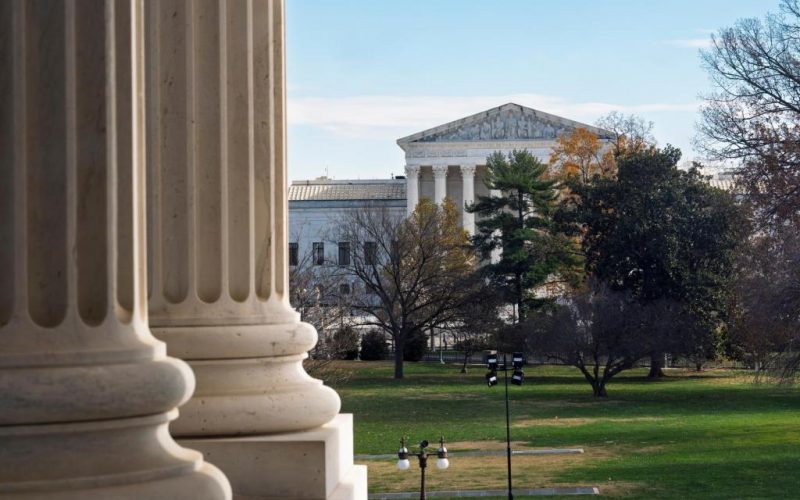By MARK SHERMAN
WASHINGTON (AP) — The Supreme Court is hearing arguments Wednesday in just its second major transgender rights case, which is a challenge to a Tennessee law that bans gender-affirming care for minors.
The justices’ decision, not expected for several months, could affect similar laws enacted by another 25 states and a range of other efforts to regulate the lives of transgender people, including which sports competitions they can join and which bathrooms they can use.
The case is coming before a conservative-dominated court after a presidential election in which Donald Trump and his allies promised to roll back protections for transgender people.
There were dueling rallies outside the court in the hours before the arguments. Speeches and music filled the air on the sidewalk below the court’s marble steps. Advocates of the ban bore signs like “Champion God’s Design” and “Kids Health Matters,” while the other side proclaimed “Fight like a Mother for Trans Rights” and “Freedom to be Ourselves.”
Four years ago, the court ruled in favor of Aimee Stephens, who was fired by a Michigan funeral home after she informed its owner that she was a transgender woman. The court held that transgender people, as well as gay and lesbian people, are protected by a landmark federal civil rights law that prohibits sex discrimination in the workplace.
The Biden administration and the families and health care providers who challenged the Tennessee law are urging the justices to apply the same sort of analysis that the majority, made up of liberal and conservative justices, embraced in the case four years ago when it found that “sex plays an unmistakable role” in employers’ decisions to punish transgender people for traits and behavior they otherwise tolerate.
The issue in the Tennessee case is whether the law violates the equal protection clause of the 14th Amendment, which requires the government to treat similarly situated people the same.
Tennessee’s law bans puberty blockers and hormone treatments for transgender minors, but not “across the board,” lawyers for the families wrote in their Supreme Court brief. The lead lawyer, Chase Strangio of the American Civil Liberties Union, is the first openly transgender person to argue in front of the justices.
The administration argues there is no way to determine whether “treatments must be withheld from any particular minor” without considering the minor’s sex.
“That is sex discrimination,” Solicitor General Elizabeth Prelogar wrote in her main court filing.
The state acknowledges that the same treatments that are banned for transgender minors can be prescribed for other reasons. But it rejects the claim that it is discriminating on the basis of sex. Instead, it says lawmakers acted to protect minors from the risks of “life-altering gender-transition procedures.”
The law “draws a line between minors seeking drugs for gender transition and minors seeking drugs for other medical purposes. And boys and girls fall on both sides of that line,” Tennessee Attorney General Jonathan Skrmetti wrote in the state’s Supreme Court brief.
While the challengers invoke the 2020 ruling in Bostock v. Clayton County for support, Tennessee relies on the court’s precedent-shattering Dobbs decision in 2022 that ended nationwide protections for abortion and returned the issue to the states.
The two sides battled in their legal filings over the appropriate level of scrutiny the court should apply. It’s more than an academic exercise.
The lowest level is known as rational basis review and almost every law looked at that way is ultimately upheld. Indeed, the federal appeals court in Cincinnati that allowed the Tennessee law to be enforced held that lawmakers acted rationally to regulate medical procedures, well within their authority.
The appeals court reversed a trial court that employed a higher level of review, heightened scrutiny, that applies in cases of sex discrimination. Under this more searching examination, the state must identify an important objective and show that the law helps accomplish it.
If the justices opt for heightened scrutiny, they could return the case to the appeals court to apply it.
Gender-affirming care for youth is supported by every major medical organization, including the American Medical Association, the American Academy of Pediatrics and the American Psychiatric Association.
But Tennessee is pointing to health authorities in Sweden, Finland, Norway and the United Kingdom that found that the medical treatments “pose significant risks with unproven benefits.”
None of those countries has adopted a ban similar to the one in Tennessee and individuals can still obtain treatment, Prelogar wrote in response.
The Williams family of Nashville, Tennessee, are among those challenging the state law. Brian Williams said that as a result of puberty blockers and hormone treatments, his transgender daughter, L.W., is a “16-year-old planning for her future, making her own music and looking at colleges.”
But because of Tennessee’s ban, she has to travel to another state to receive the health care that “we and her doctors know is right for her.”
Associated Press writer Lindsay Whitehurst contributed to this report.
Originally Published:









